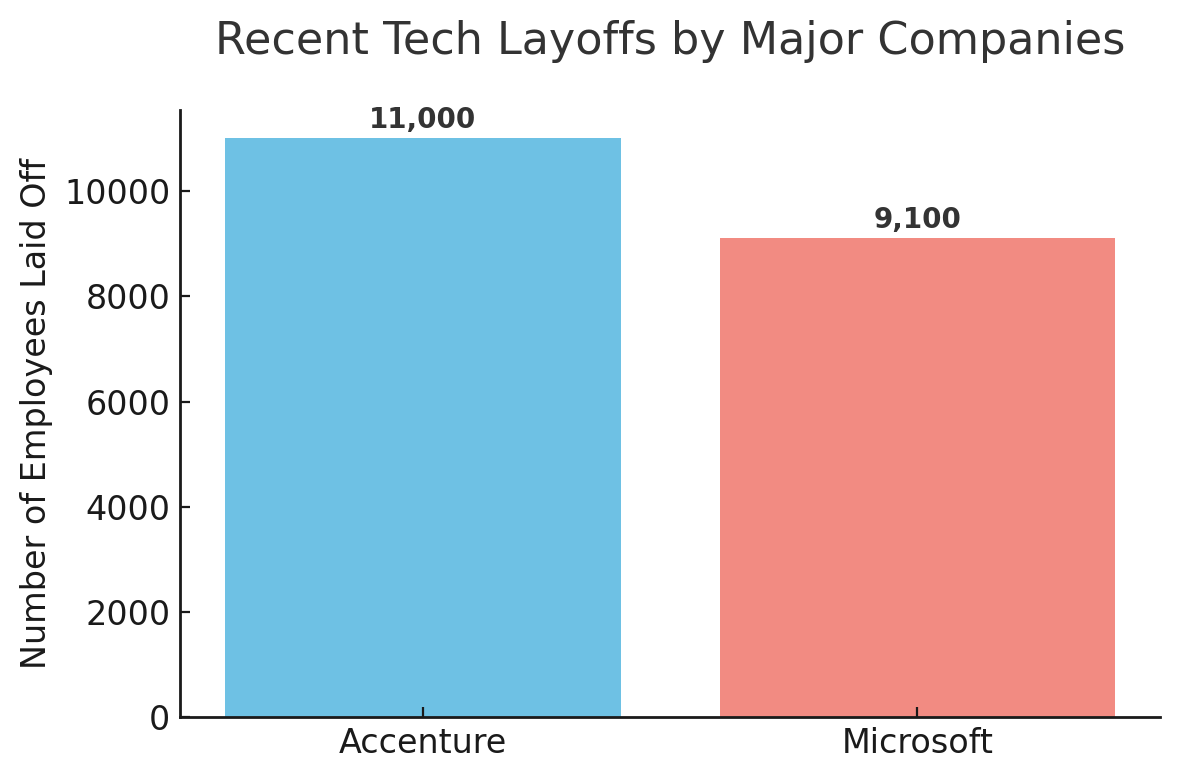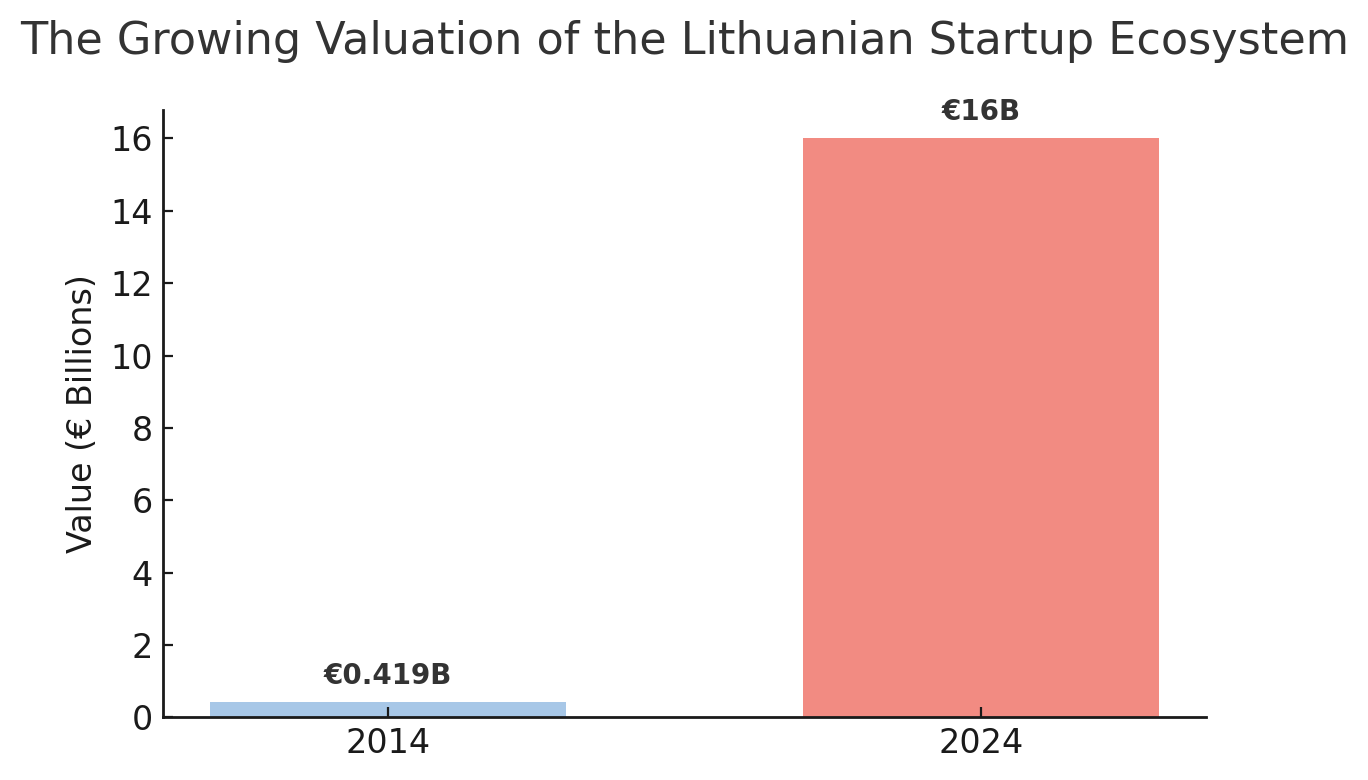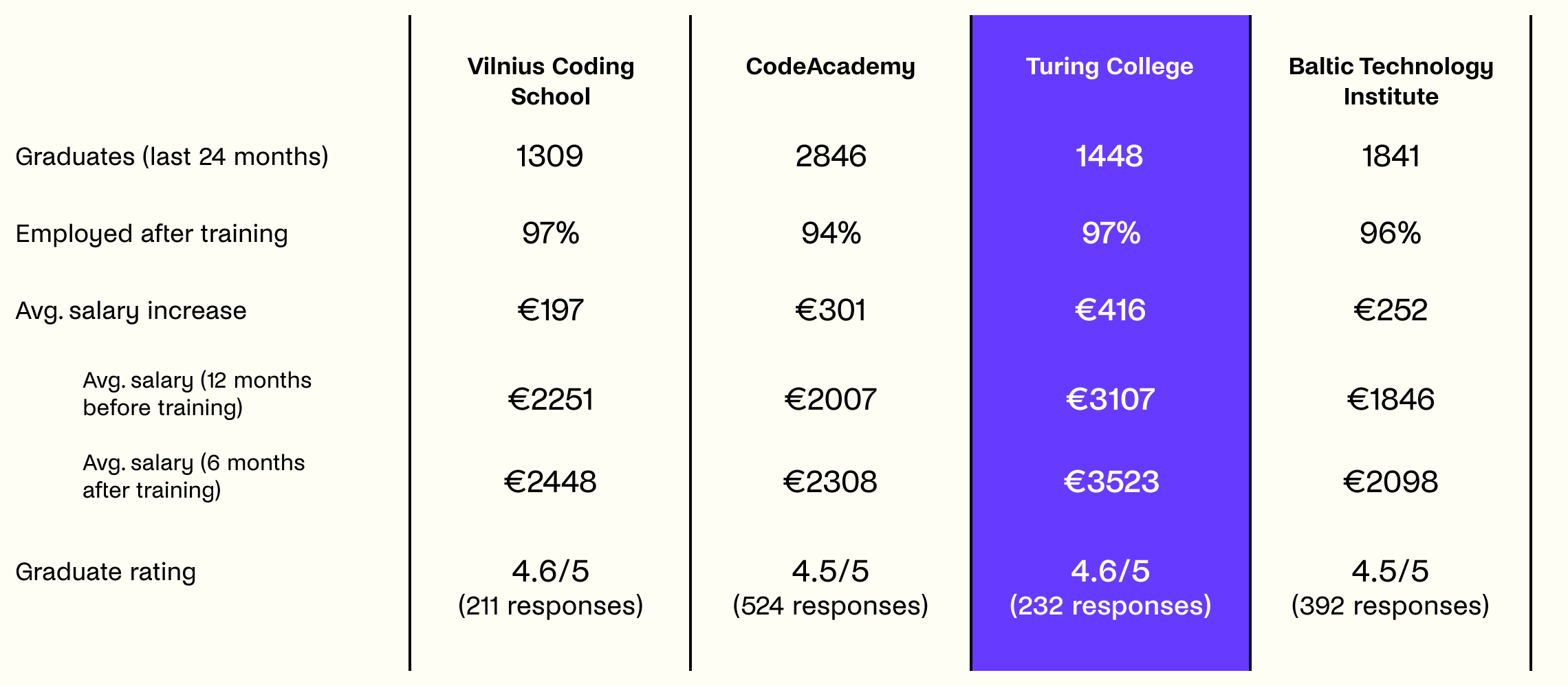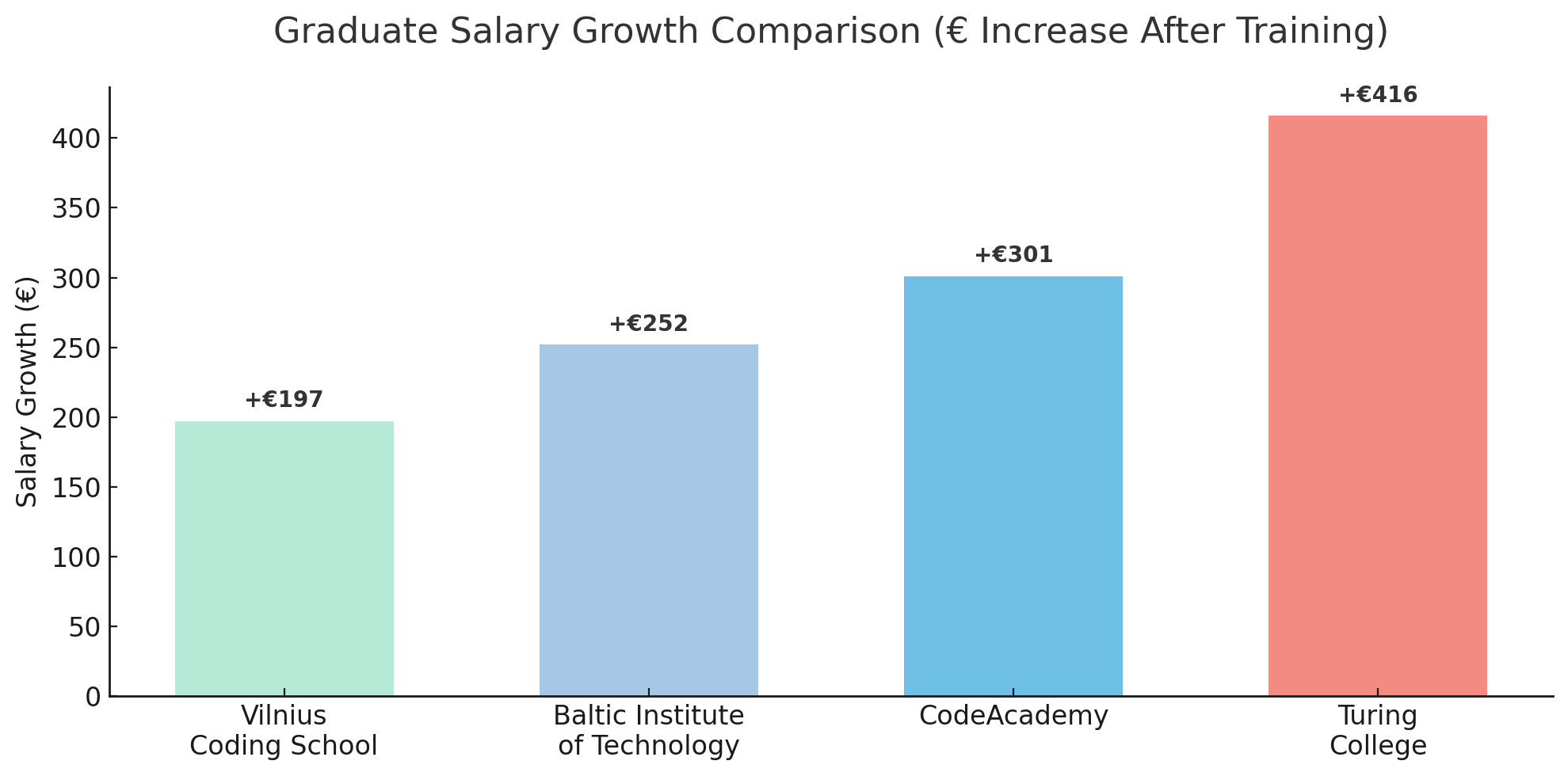
Artificial intelligence is the tide that keeps pulling the tech world in new directions. Some companies shrink or disappear, others surge forward, but one pattern is clear: those who keep learning stay afloat, those who don’t risk sinking.
So how is AI progress reshaping today’s Lithuanian job market and career opportunities? And where should you study if you want training that will keep your skills up to date and lead to getting hired or promoted? The Employment Service dashboard, published in July 2025, gives an answer (Užimtumo tarnybos (UŽT) „Profesinio mokymo efektyvumo švieslentė“).
[H2] How AI Is Changing the Job Market
In the last two years, headlines were filled with global tech giants making brutal cuts. Microsoft announced 9,100 layoffs. Accenture shed more than 11,000 people, then poured nearly a billion euros into retraining staff for AI.

In Lithuania, the story looks different. The Tesonet group grew by 40% in 2025, Hostinger rolled out an AI assistant that saves €9 million a year, and Lithuania’s startup ecosystem reached €16 billion in value (up 39-fold from 2014).

Companies are chasing efficiency and innovation, but there’s a bigger shift happening driven by AI development and adoption. AI increasingly takes over repetitive tasks like data entry or basic customer support, leaving real demand for people who can solve problems creatively and think analytically and strategically. Technical knowledge alone no longer guarantees career security. If you want to reskill or upskill, you need to find a course that prepares you for AI-driven roles, offers an up-to-date curriculum by partnering with industry experts and helps you land a job.
So which tech schools in Lithuania deliver real results? Let’s look at the Employment Service dashboard.
[H2] How the Employment Service (UŽT) Measures Results
Marketing headlines often promise a fast track into IT. This dashboard does something different. Originally launched in 2024 by the Employment Service, it’s a public database that updates every quarter with hard numbers from state-funded training. It reveals:
- how many people actually finished the program;
- how many found jobs within six months;
- how salaries change after graduation;
- how many chose to launch their own businesses;
- how graduates rate their training quality and usefulness.
The data compares both public and private providers, giving a full view of the market rather than cherry-picked success stories.
[H3] Comparison of Top Schools Offering UZT-Funded Courses
For this analysis, we narrowed the field to the largest and most-reviewed providers — those with at least 1,000 graduates in the past two years and 100+ verified reviews. This way, the results reflect not just one-off cases but consistent performance across hundreds of learners.
Within this group, we focus on three key indicators:
- Number of graduates – a signal of scale and capacity.
- Salary growth – evidence that training translates into higher-paying jobs.
- Graduate feedback – a measure of how well the training matched expectations and prepared people for real work.
By applying these filters, four private training providers stand out: Turing College, CodeAcademy, Vilnius Coding School, and the Baltic Institute of Technology (BIT). Together they trained thousands of learners and shaped much of Lithuania’s talent pipeline.

[H3] How to Analyze the Data
The dashboard shows salaries increased across all major schools, but not at the same pace.
- Turing College graduates saw the biggest jump: +€416.
- CodeAcademy recorded +€301.
- Baltic Institute of Technology had a €252 increase.
- Vilnius Coding School showed +€197.
On the surface, that makes Turing College the winner. But raw numbers don’t tell the whole story. Its students already earned more before training, which reflects the school’s focus on advanced, specialized programs. For academies that attract beginners, salary growth is naturally smaller because learners start from a lower baseline.
Employment outcomes are another piece of the puzzle. Here the dashboard shows remarkable consistency: 96–97% of graduates from the leading schools found jobs, which means learners across the board were able to enter the market quickly. Graduate reviews also back this up: Turing College and Vilnius Coding School both score 4.6/5, while CodeAcademy and BIT score 4.5/5.

[H2] The Top Four Training Providers
The dashboard proves that training pays off. But the right choice depends on your starting point, the field you’re interested in, and the learning model that works best for you.
[H3] Turing College — Best for AI and Data-Driven Careers
A project-based academy focused on data analytics and AI, Turing College achieved the highest average salary increase (€416) and one of the strongest satisfaction scores (4.6/5). Its selective admissions and English-language, project-based model attract motivated learners aiming for careers in AI and data.
Who it’s for: Independent learners who value structure, practical skills, and flexibility.
Format: Self-paced online learning with 1:1 feedback from mentors, peer review, and hands-on portfolio projects.
Funded courses: AI Engineering, AI for Business Analytics.
[H3] CodeAcademy — Largest Provider for Beginners
One of Lithuania’s largest coding schools, CodeAcademy offers a wide range of tech programs: from software development to design and cybersecurity. It partners with local employers such as Adform, Vinted, and Danske Bank to align training with real market needs. According to the dashboard data, its graduates’ salaries grew by +€301, and reviews give it a 4.5/5 satisfaction rating.
Who it’s for: Beginners looking for structured group learning in Lithuanian.
Format: Instructor-led sessions, in-person or hybrid.
Funded courses: Web Design, DevOps, Cybersecurity, and more.
[H3] Baltic Institute of Technology — Automation and Data Focus
The Baltic Institute of Technology (BIT) focuses on robotics, process automation, data analytics, and cybersecurity. Employment outcomes are high (96%), and programs are designed for both beginners and professionals seeking to upskill.
Who it’s for: Professionals aiming to enhance automation or data-related skills.
Format: Blended learning with strong ties to EU and UŽT projects.
Funded courses: Robotics, Data Analytics, AI Integration, QA
[H3] Vilnius Coding School — Fast Track for Career Changers
Known for intensive short courses, Vilnius Coding School helps beginners transition into IT quickly. It works closely with 200+ Lithuanian companies and hosts the annual TECH Fair to connect students with employers. It shows a 97% employment rate and a 4.6/5 rating. Salary growth was smaller (+€197), which reflects its focus on entry-level training in Lithuanian for career changers.
Who it’s for: Career changers starting from zero.
Format: Bootcamp-style, mostly evenings and weekends.
Funded courses: Web Development, Python Programming, Data Analytics, and more.
[H2] How to Use This Data to Choose Your Path
While salary growth varies, the differences mainly reflect the student profiles — specialized learners already in tech see higher pay jumps, while beginners gain entry-level roles. Across all schools, employment outcomes and graduate satisfaction remain consistently strong.
The key takeaway: Lithuania’s leading academies prepare people for real jobs, but your ideal choice depends on your goals, experience level, and preferred learning style.